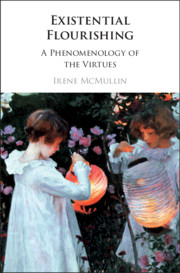Crossref Citations
This Book has been
cited by the following publications. This list is generated based on data provided by Crossref.
McMullin, Irene
2019.
The International Encyclopedia of Ethics.
p.
1.
McMullin, Irene
2020.
Levinas and Løgstrup on the Phenomenology (and Metaphysics?) of Moral Agency.
The Monist,
Vol. 103,
Issue. 1,
p.
38.
Giolito, Vincent J.
Liden, Robert C.
van Dierendonck, Dirk
and
Cheung, Gordon W.
2021.
Servant Leadership Influencing Store-Level Profit: The Mediating Effect of Employee Flourishing.
Journal of Business Ethics,
Vol. 172,
Issue. 3,
p.
503.
Burch, Matthew
2021.
Make applied phenomenology what it needs to be: an interdisciplinary research program.
Continental Philosophy Review,
Vol. 54,
Issue. 2,
p.
275.
Anderson, Kenneth A.
2022.
Life Engineering: The Good Life as an Engineered Product.
Axiomathes,
Vol. 32,
Issue. 6,
p.
1169.
Drummond, John J.
2023.
Horizons of Phenomenology.
Vol. 122,
Issue. ,
p.
49.
Kaszynska, Patrycja
2023.
Valuation through Narrative Intelligibility.
Valuation Studies,
Vol. 10,
Issue. 1,
p.
148.
Hess, Gérald
2024.
Virtue Ethics and the Ecological Self: From Environmental to Ecological Virtues.
Philosophies,
Vol. 9,
Issue. 1,
p.
23.





